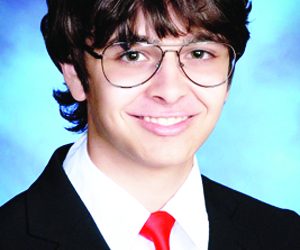By Doug Given
Brigadier General James Kemp Mclaughlin was born in Braxton County, West Virginia December 7, 1918. This seem to be ironic presaging the United States involvement in World War II and his involvement in that conflict. He was the son of James Blaine (JB) Mclaughlin from Glendon who was the Agricultural Commissioner of the state of West Virginia from 1933-1955. He grew up on my farm and was good friends with my father. He went to WVU and in 1938. The Army came around and told him he would make a good pilot. He wanted to enlist, but because he was under 21 he could not unless his parents consented. Consequently, he had to wait until he was 21 to join the United States Army Air Corp. He became a B-17 pilot for the Mighty Eighth Air Corps.
One of his first assignments as a pilot in England was to take up a reporter who had been writing bad things about our airplanes in the London paper. He took him up to 25,000 feet and the reporter sneered. “Is this the best you can do? “. He took him up to 30,000 feet which was cruising level for a B-17. The best British bomber could only fly up to 28,000 feet. Again, the reporter sneered and asked him if that was the best he could do. Kemp started having engine trouble and was flying on 3 engines. He took him up to 35,000 feet and again the reporter sneered. He took him up to 39,000 feet on three engines. The flight engineer said “Cap, your passenger is looking a little green. I think you better take him down.” Kemp reported what happened to his commanding officer and promptly got chewed out. He said “Mclaughlin, the B-17 was meant to fly 30,000 feet all day and 35,000 feet in an emergency. It was not designed to fly at 39,000 feet.” It goes to show you what somebody from Braxton County can accomplish!
On his first mission, he was the copilot, and on the way back, one of the engines was on fire. The pilot put on his parachute and got in the belly of the plane, preparing to bail out. Kemp flew it back to England, and landed it, Kemp was at Normandy bombing the enemy. He also participated in the invasion of North Africa. He was the lead bomber pilot on Black Thursday, the second daylight bombing raid into Germany at Schweinfurt ball bearing plant. He flew in with 25 B-17. He flew out with four. They lost 60 B-17s of 291 that day with 10-man crews. Seventeen were damaged beyond repair. It is the bloodiest air battle in the history of the world. This was an important bombing mission because it was a ball bearing plant, and everything runs with ball bearings.
He also bombed Hitler’s heavy water plant. Heavy water is required to build a nuclear bomb. The plant was in Norway, and when he arrived on destinations, he started having some engine trouble. One engine quit, and he could not feather the prop so that it would not slow him down. On the return trip it spun faster and faster until the engine glowed red hot. Then the prop seized and slowed them down considerably. He was sure they would be shot down. This went on until they got back to base in England. The crew exited the plane and the engine burst into flames. The fire crew asked him if he wanted them to put it out. He said, “let the damn thing burn!”
He had many close calls flying the B-17. One time he had to crash land in Irish farmland, taking out stone walls. His plane had high ranking officers seated in it and he was bringing them to England from Africa. They had requested that he fly over the ocean instead of Africa to avoid anti-aircraft fire. He and his co -pilot were not real happy about it because it was out of their routine and they probably did not have adequate navigational charts. They were about to run out of fuel and had to make the decision to land. They circled the town for a while to burn up fuel so that they would not catch on fire when they crashed. He was sure the local populace would come up and lynch them. Instead, they came up with bottles of whiskey, and got rip roaring drunk. A book was written by Irishman Paul Browne, Eagles over Ireland.
Initially, in the war after 25 combat missions, you could go home. He flew 24 and his commanding officer would not let him go on the 25th because he did not want him to leave their group. He told his officer that if he could have one month to go home and marry his girlfriend, he promised to come back until the war was over. He did so and flew 39 missions.
For his gallantry in World War II after flying 39 combat missions, he was awarded 4 Distinguished Flying Crosses, US Army Air Corp Medal with 8 clusters, the French Croix de Guerre, and a Presidential Unit Citation. Being a member of the Mighty Eighth Air Corp was extremely dangerous. To put things into perspective, the Mighty Eighth Air Corp lost more men than the entire United States Marine Corps in World War II! The average life expectancy of a Mighty Eighth Air Corp aircrew was 11 missions.
At the end of the war Kemp transitioned to flying fighter planes, which was extremely unusual for a bomber pilot to do. After the war, Kemp was assigned duty organizing the first West Virginia Air National Guard which he commanded for 30 years. The first unit was in Charleston, West Virginia then moved to Martinsburg. They flew P 51 Mustangs. When I was a child, he used to fly from Charleston to Martinsburg and he would buzz our house. We would run out to wave, but we would never see him because he was long gone at 400 miles per hour!
General Mclaughlin continued to serve his country until he retired from the Air Force and also served in local politics in Kanawha County. He also wrote a book titled the Mighty Eighth in World War II. He died at 101 years old.
He was larger than life at 6 foot 5. Incidentally, I have flown on a B-17 and it is really hard to get up to the front where the pilot sits because you have to walk through the bomb bay on less than probably a 12 inch catwalk with the bomb racks on both sides. I had dinner with him one evening at the Days Inn. I said “Kemp, you are a hero.” He said, “No, I am not. The heroes did not come home.”



